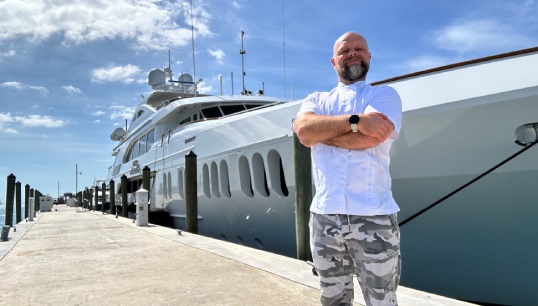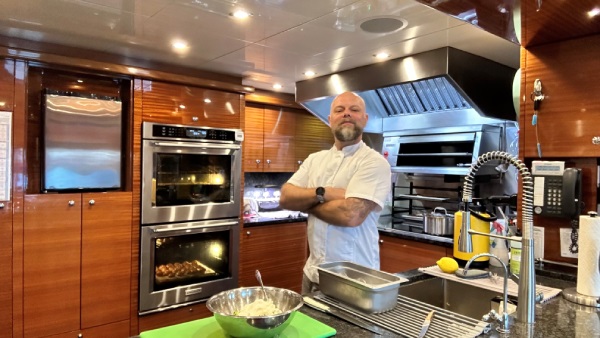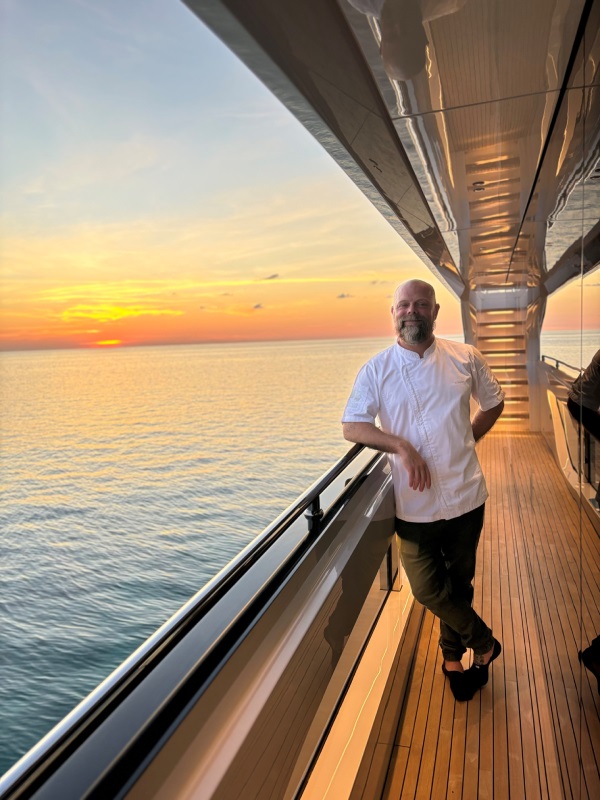- Topics
- Campaigning
- Careers
- Colleges
- Community
- Education and training
- Environment
- Equality
- Federation
- General secretary message
- Government
- Health and safety
- History
- Industrial
- International
- Law
- Members at work
- Nautilus news
- Nautilus partnerships
- Netherlands
- Open days
- Opinion
- Organising
- Podcasts from Nautilus
- Sponsored content
- Switzerland
- Technology
- Ukraine
- United Kingdom
- Welfare

While television shows like Below Deck portray working on a superyacht as a glamorous lifestyle, the reality is that it takes dedication, discipline and drive to succeed as a chef in this competitive industry. For the latest episode of our Off Course podcast, Helen Kelly spoke with maritime influencer chef Danny Davies, aka the @FutureChefProject, a veteran chef with over seven years of experience on superyachts, who shared insights into the challenges and rewards of working at sea
Chef Danny Davies's journey to working onboard superyachts was somewhat unconventional. Danny describes his younger self as a bit of a 'troublemaker', often getting into mischief. To keep him occupied, his mother would take him to her job working at a local pub on Sundays, where Danny quickly found his calling. While his mother worked, Danny would hang about in the kitchen, captivated by the cooking process, and he soon fell in love with the art of food preparation.
This early exposure sparked a lifelong passion for cooking that would shape the rest of his career. Rather than let his troubled youth derail him, Danny channelled his energy into honing his culinary skills.
He went on to serve for 10 years in the military, where he had the honour of cooking for high-profile guests like Prince Harry and Prince William. This military experience not only refined Danny's cooking abilities, but also instilled in him a strong sense of discipline and organisation – traits that would prove invaluable in his future superyacht endeavours.
After leaving the military, Danny transitioned into teaching, developing an innovative approach to culinary education. He would cook dishes and record the process on YouTube for his students to reference. This 'flipped learning' model empowered Danny's students, many of whom had speech and language difficulties, to excel in the kitchen. It is something he remains proud of to this day.
It was this combination of hands-on experience, military training, and creative teaching methods that ultimately prepared Danny for his next adventure as a superyacht chef.
Working hard to make a living
Danny has now worked onboard vessels of all sizes, from smaller yachts of between 40-60 metres through to 100-metre-plus vessels. He says guests have high expectations for the culinary experience, and chefs must deliver perfection every time. While traditional culinary skills remain essential, a superyacht chef's ability to prepare high-quality, innovative dishes is becoming increasingly important.
Superyacht guests also often have specific dietary requirements. Chefs must be able to effortlessly cater to diverse dietary needs such as vegan, keto, or allergen-free, while maintaining the luxury experience for all passengers.
A typical day with guests onboard for chef Danny starts before dawn as he prepares breakfast items like pastries, eggs, bacon, or waffles, and other dishes for both guests and crew.
After breakfast he moves straight onto lunch prep, and food prep for any excursions guests have planned.
In between meal services, he meets with the principal guest to discuss the day's menu and make adjustments based on the guests' plans. He may also spend time managing inventory, adhering to import/export regulations, and dealing with any unexpected challenges – such as missing items – that arise.
Danny may get an hour or two off in the afternoon before the grind starts again with dinner service, followed by clean down and light prep for the following day.
With 15-hour days in the galley typical before he collapses into bed, it’s no wonder Danny jokes about being a 'galley goblin'. There’s little time to top up his tan or indulge in relaxation or sports.

Cabin fever
With long hours and confined living spaces, there is a huge potential for 'cabin fever' onboard and interpersonal conflicts often arise, Danny says.
There are a few key strategies he employs to deal with the stress. He likes to adopt a positive mindset and not let minor issues or conflicts get to him. He tries to maintain perspective, to remember that many problems in the moment won't matter in a few days' time.
Exercise is a key outlet for stress. He tries to fit in workouts, especially during guest-free periods, to maintain his energy and mental wellbeing.
He meditates daily. On breaks, he uses breathing techniques to reset and shake off minor frustrations that could otherwise build throughout the day.
In the evening, he tries to avoid dwelling on work-related issues and instead he prepares mentally for the day ahead during his morning routine.
By staying highly organised with lists and schedules, he can better manage the constant demands on his time. This helps prevent him from feeling overwhelmed by the sheer volume of tasks.
The payoffs
While the work is undoubtedly demanding, the financial rewards, adventurous lifestyle, culinary challenges, and exclusive nature of the superyacht industry are major draws for chefs like Danny. The opportunity to travel the world and cook for discerning clients makes it an attractive career path for those willing to put in the hard work.
The financial reward can also make it worthwhile, Danny says. Pay can be two to three times higher than a land-based chef position, with the potential for substantial tips.
When I met chef Danny in London for this article and podcast episode, he was about to embark on a family-owned private cruise vessel, heading to Scotland and the Arctic. After that, a gig in the Bahamas, followed by the Monaco Yacht Show. His galley onboard, and his new home on the east coast of America, must seem a very long way from that pub in England.

So, you want to be a superyacht chef?
Chef Danny Davies advises aspiring superyacht chefs to gain experience on land before making the leap to sea. Fresh from college, positions like chef's assistant can help break into the industry. With time, Michelin-star credentials may open doors on the largest superyachts.
The size of the yacht greatly impacts the chef's responsibilities and the level of culinary expertise required. On smaller boats chefs must be highly versatile, handling everything from meal preparation to inventory management on their own. Larger superyachts, on the other hand, may have more specialised kitchen staff, allowing chefs to focus on creating exceptional dining experiences for guests.
It is mandatory for all crew working on commercial vessels to complete basic training certification, including STCW (Standards of Training, Certification and Watchkeeping), which covers firefighting, personal survival techniques, and first aid. Additionally, all crew must pass an ENG1 Medical Certificate, which ensures physical and mental fitness to work at sea.
These certifications must be renewed annually and can cost thousands of pounds. Failure to renew on time means having to retake entire courses.
Watch on NautilusTV!
Listen to the podcast!
Tags
More articles
Travel with Liberty: from social media side hustle to a new kind of maritime career
Embracing traditional navigation in the digital age
The TikTok Captain demystifying container shipping
Time out with a trailblazing third officer
Off course podcast : series 3 - join us for a sideways look at life at sea
Nautilus wins TUC award for campaigning 'Off Course' pod
Nautilus International, the global trade union for maritime professionals, has been awarded the 2024 Trades Union Congress (TUC) Communications Award for 'Best Communication from a Smaller Union' for its podcast series, Off Course: A Sideways Look at Life at Sea.
Schengen Area update: be aware of new systems regulating entry
Nautilus is advising members, especially those working in the yacht sector, to be aware of two changes to rules regarding entry into the Schengen Area which are expected to come into force during late 2024 and 2025.
